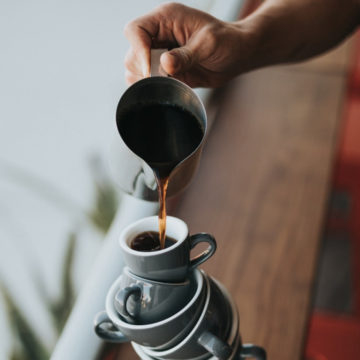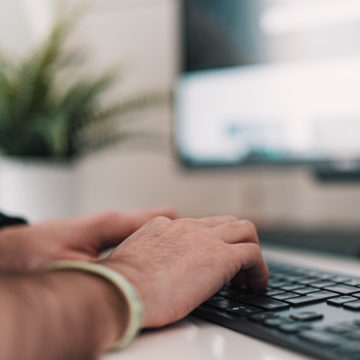You might have heard the term “holistic” used a lot when talking about our health. In medicine, holistic health means treating a person as a whole, including mental and social factors, and not just the symptoms of what they’re experiencing.
Mental and physical health are inextricably linked. This is backed up not only by multiple studies but our own collective knowledge and understanding of our health — think of phrases like “you’ll worry yourself sick.”
While we often talk about our holistic health as how our mental well-being can directly impact our physical health, it goes the other way, too. Sure, if we have pain in our bodies or a chronic condition to live with that will clearly have an effect on how we feel. But it also gives us an opportunity to notice the physical manifestations of our mental state.
From there, we can immediately take action to make our bodies feel better. Ultimately, this will not ease the physical sensations but help address the mental stress that initially caused them in the first place.
Learn how to recognize what you’re feeling
Anxiety causes a long list of physical symptoms and it also makes normal sensations, like the beating of your heart, feel more noticeable. Our bodies have mild moments of discomfort all the time, some that we don’t even register, but when our bodies are primed by stress these “normal” physical sensations can feel extremely alarming.
Some of the most common physical symptoms of anxiety include:
- Heart palpitations
- Uncontrollable trembling or shaking
- Shortness of breath
- Choking sensations or difficult swallowing
- Nausea or vomiting
- Dizziness or lightheadedness
- Hot and cold flashes
- Sensitivity to light and sound
Here are four common approaches to managing physical symptoms of anxiety that can not only help your body feel better almost immediately but will have a lasting impact on your mental well-being in the long run.
1. Breathe
There’s a reason why breathing deeply is recommended in a variety of medical theories as a key way to immediately relax and calm the body. Deep breathing, also known as diaphragmatic breathing, is a direct line to our brains that automatically slows down the various systems that are aggravated by stress.
Try breathing in through your nose for a count of four, hold it for a count of seven, and then breathe out for a count of eight. Aim for one-five minutes in total. Deep breathing in this way can help relax your muscles and reduce your levels of anxiety-inducing stress hormones like cortisol.
The benefit of connecting to your breath is just one of the new mental wellness habits you can build with our Exercise Mindfulness Health Program.
2. Exercise
There are a lot of great reasons to get regular exercise. Another is that it can go a long way in helping relieve physical feelings of anxiety. Over time, as you become more relaxed following exercise, it can help alleviate any symptoms in your body before they even start.
Some studies show that exercise acts as a way of helping your body “practice” dealing with stress in a safe and controlled way. When actually feelings of anxiety come up, you’re physically better prepared to handle them than you would be without exercising at all.
Regular exercise also helps increase the baseline level of oxygen in your blood. Just like deep breathing, stronger cardiovascular health primes your body to be more able to remain physically calm.
By relieving tension in your body, you’ll also experience higher levels of energy and better quality of life, which, in turn, will help improve your mood. Ready to begin regular activity but aren’t sure where to start? Our Get Started with Fitness Health Program shows you how to start a long-term workout habit in just 21 days.
3. Avoid stress where you can
Ok, so this sounds obvious and we get it: “avoiding stress” is easier said than done. A majority of anxiety is usually caused during major facets of our life — like school, family, or work — that you can’t simply turn away from.
But there are some less well-known lifestyle triggers that might be jumpstarting your system and causing you physical anxiety that can be fairly easily avoided.
Stay on the lookout for:
- Frightening movies, like horrors or thrillers
- Loud, overly-stimulating music
- Over-exposure to social media, news, or politics
- Long, uninterrupted periods of time on your phone, watching TV, or gaming
There are some stressful situations that you simply won’t be able to avoid — but you can prepare yourself in advance. Our Building Resilience Health Program gives you quick tools you can use to always be prepared for the anxiety-inducing moments that life will inevitably throw your way.
4. Steer clear of nutritional triggers
Some foods and drinks, while they might make us feel good short-term, can actually make anxiety worse and its physical symptoms more pronounced.
Caffeine, sugar, and alcohol are the top three culprits. If you’re feeling regularly stressed and catch yourself reaching for any of those to get a quick boost, it’s a good sign to try cutting them out for seven to ten days to see what impact it has on your well-being.
Skipping meals can be just as harmful, so keep an eye out for the regularity of your daily eating habits just as much as the types of food on your plate.
Getting enough water throughout the day is crucial for a well-functioning body and to help you avoid cravings. Our Boost Your Hydration Health Program gives you easy tips on how to boost your H20 intake for better health.






